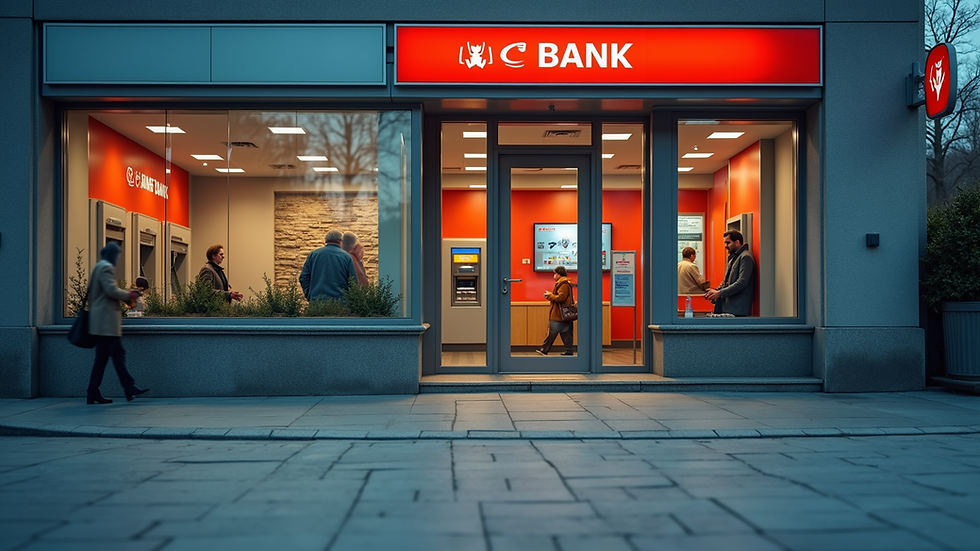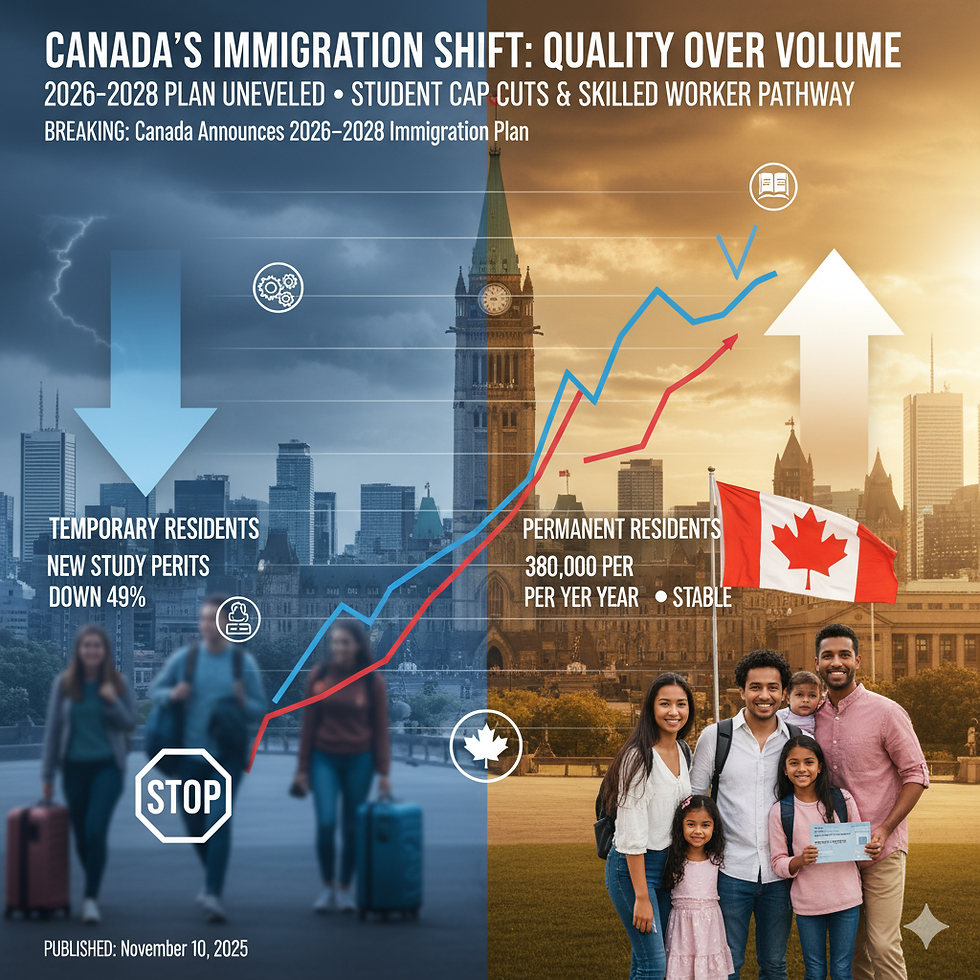Newcomer to Canada Checklist: Practical Advice for Newcomers
- Ardalan Ansari
- Aug 18, 2025
- 7 min read
Moving to a new country can be both exciting and challenging. Canada, known for its welcoming communities and beautiful landscapes, attracts thousands of newcomers every year. However, starting fresh in a new environment requires preparation and knowledge. This guide offers practical advice to help you navigate your first months in Canada smoothly and confidently.
First 7 Days: Do-These-Now Checklist For Newcomers in Canada
Get your SIN (Social Insurance Number).Visit Service Canada with your passport and immigration document. You need a SIN to work and for tax reporting. Keep it private—only share it with employers, banks, or the CRA.
Apply for provincial health coverage (BC: MSP).In British Columbia, apply for MSP as soon as you settle. If there’s a waiting period, consider temporary private insurance to cover the gap. Keep copies of your application and any confirmation emails.
Open a Canadian bank account.Ask about newcomer packages (no-fee accounts, free international transfers, or cash bonuses). Bring your passport, immigration document, proof of address (hotel or letter from a host can work), and SIN if requested.
Get a mobile plan + essential apps.Pick a plan that includes Canada-wide calling and enough data for maps and job search. Install banking, transit, weather, and note-taking apps (you’ll use them daily).
Secure short-term housing.If you don’t have a long-term place yet, book a short-term rental while you view apartments. Keep receipts (proof of residence helps with other steps).
Transit setup (Vancouver/BC).In Metro Vancouver, buy a Compass Card and learn the TransLink Trip Planner. Save your home/work/school as favorites.
Emergency + local basics.Program 911 (emergency), your embassy/consulate, a nearby clinic, and your landlord’s number. Find your closest grocery, pharmacy, and walk-in clinic.

Residency Obligation for Permanent Residents
To keep PR status, you must be in Canada at least 730 days within any 5-year period. Days don’t need to be continuous. Some time abroad can count if you’re:
Accompanying a Canadian-citizen spouse/parent, or
Employed full-time by a Canadian business (or the public service) outside Canada.
Tip: Track your days (calendar/app) and keep travel records. PR obligation (730/1825 ≈ 40%) is different from citizenship physical presence (generally 1,095 days in 5 years).

Days 8–30: Build Real Momentum
1) Lock in Long-Term Housing
Know what landlords expect: Government ID, proof of income (job offer, pay stubs, or savings), references, and sometimes a credit check. If you’re new, a larger deposit or a co-signer may be requested.
Viewing strategy: See listings in daylight, test water pressure, check laundry and heating, and ask about noise. Take photos of existing wear when you move in.
Avoid scams: Never send deposits before viewing; meet in person; sign a written lease; get receipts. If a deal looks too good to be true, it is.
BC-specific: Learn the basics of deposits, entry notices, and rent increases. If you’re unsure about a clause, ask before signing.
2) Healthcare: How to actually use it
BC: MSP covers medically-necessary services. After you apply, keep your confirmation and set a reminder to follow up if you don’t receive your card on schedule.
Family doctors are scarce: Join waitlists and use walk-in clinics in the meantime. Keep a list of your prescriptions, allergies, and past conditions.
Prescriptions: Prices vary. Ask pharmacists about generic options and any discount programs.
Dental & vision: Not covered by MSP for most adults. Consider private plans if you’ll need regular care.
3) Money 101: Set your Canadian financial foundation
Budget right away: List your fixed costs (rent, transit, phone, groceries) and set aside 5–10% for emergencies. Prices feel different until your first few paycheques land—budgeting is your safety net.
Credit history starts now: A $1,000-$2,000 limit on a first credit card is normal. Pay in full monthly to build a strong score for future rentals, car loans, and even jobs.
Banking tools: Set up e-Transfers, alerts for low balances, and automatic bill payments so you don’t miss due dates.
Taxes: If you work or study, you’ll likely file a tax return the following year. Keep pay stubs and T4/T2202 slips in one place.
Benefits & credits: Once you have a stable address and file taxes, you may become eligible for federal/provincial benefits. Read the eligibility carefully and apply on time.
4) Find Work Faster
Resume, Canadian style: Ditch photos and personal details. Lead with results (metrics > duties). Use plain language, bullets, and keywords that match the job post.
Where to search: Job Bank, LinkedIn, company career pages, and industry associations. Turn on job alerts. Apply early—popular roles fill fast.
Networking that actually works: Aim for two short conversations a week. Join a professional association or local meetup, and prepare a 30-second “who I am + what I do + the value I bring.”
References: Line up two to three references (Canadian if possible, but international is fine). Ask permission and confirm contact details.
Credential recognition: If your career is regulated (health, engineering, teaching, finance, etc.), check the regulator’s website for assessment steps, exams, and bridging programs. Start paperwork ASAP—it can take time.
“Survival job” vs. long-term plan: It’s okay to take a short-term role while you upskill or wait on licensing. Keep your eye on the main target and block weekly time for applications/networking.
5) Education: Kids and adults
Children (K–12): Register early with your local school district. Typical documents: passports, proof of address, immunization records, and prior transcripts. Ask about English language supports if needed.
Adults: Explore language classes (English/French), college certificates/diplomas, and continuing education. Many programs offer flexible evening/weekend formats.
Language matters: Better language = better jobs. Even advanced speakers benefit from workplace-focused courses to sharpen email, presentation, and interview skills.
6) Transportation & Driving (Vancouver specifics)
TransLink & Compass Card: Load monthly passes or stored value. The Trip Planner and real-time bus info are lifesavers when you’re new.
Driving: If you plan to drive in BC, check the steps to exchange your foreign licence. Practice local road signs and four-way stop etiquette—both are a bit different from many countries.
Bikes & ride-hailing: Vancouver is very bike-friendly and ride-hailing is widely available. Many neighborhoods are easily walkable.
7) Community & Belonging
Join newcomer groups: Look for local organizations that host orientation sessions, language practice circles, and job-readiness workshops.
Volunteer: It’s a fast way to gain “Canadian experience,” build references, and meet people who can open doors.
Public libraries are gold: Beyond books, you’ll find free workshops, language conversation circles, and even equipment you can borrow.
Religious and cultural communities: If it’s part of your life, these can be a ready-made support network and a source of practical help when you’re new.
Meetups & sports: Outdoor groups, sports leagues, and hobby clubs make it easier to make friends without small talk that goes nowhere.
8) Legal/Status Essentials
Permanent residents: The residency obligation is 730 days (2 years) in any rolling 5-year period. Days don’t need to be continuous. Time outside Canada may count only in specific cases (e.g., accompanying a Canadian-citizen spouse/parent or working for a Canadian business/public service abroad).There is no “90% rule.”
PR card & travel: Keep your PR card valid if you’ll travel. Track days abroad with a calendar or app and keep travel records.
Citizenship (later): Generally requires 1,095 days of physical presence in the past 5 years before applying (check the official calculator when you’re closer).
Temporary residents: Study/work permit conditions matter. If you change schools/employers or extend your stay, file the right applications on time.
9) Digital Setup: Admin that makes life easier
Government accounts: Create online accounts for tax (CRA), employment insurance/pensions (My Service Canada), and provincial services (in BC, the BC Services Card app and Health Gateway are useful).
Secure your data: Use a password manager and turn on two-factor authentication for email, banking, and government portals.
Document vault: Keep scans of your passport, immigration documents, lease, insurance, and vaccination records in a secure cloud folder. Share access with a trusted partner if applicable.
10) Safety, Rights, and Everyday Know-How
Emergencies: Dial 911 for police, fire, or ambulance. For non-emergency police questions, look up your city’s non-emergency line.
Workplace basics: You’re entitled to a written offer/contract, pay statements, and a safe workplace. Ask HR how to report concerns confidentially.
Tenancy: Keep copies of your lease, receipts, and all messages with your landlord in writing.
Weather & outdoor safety: Even if Vancouver is mild, mountain weather shifts fast. Tell someone where you’re hiking and check conditions before you go.
Vancouver-Specific Tips
Transit efficiency: Combine SkyTrain + bus for most commutes; SeaBus for North Shore trips. Off-peak times are less crowded.
Neighborhoods are distinct: Visit at different times of day to get a feel for commute, noise, and amenities.
Rain gear > umbrella: For 8–9 months of the year, a good rain jacket and waterproof shoes beat juggling an umbrella on windy days.
Free fun: Beaches, seawall walks, community centre activities, library events, and neighborhood festivals are inexpensive ways to explore and meet people.
Why This Matters
Settling fast saves money, stress, and time. Following a clear newcomer to Canada checklist helps you:
Avoid avoidable costs (late fees, emergency care without coverage, last-minute housing scrambles)
Shorten your job search with a professional resume and focused networking
Stay compliant with PR/permit rules so you never risk your status
Build a support network that makes Canada feel like home
Frequently Asked Questions (FAQ)
1) Do I need a SIN before I can work?
Yes. Employers need your SIN for payroll and taxes. Apply as soon as you arrive and keep your SIN private.
2) Can I open a bank account without Canadian credit history?
Yes. Most banks have newcomer packages. Bring ID and immigration documents; proof of address helps.
3) Does time outside Canada ever count toward the PR residency obligation?
Sometimes. It may count if you’re accompanying a Canadian-citizen spouse/parent or working full-time for a Canadian business or the public service abroad. Otherwise, only days physically in Canada count. Track your days carefully.
4) Should I buy private health insurance if I’m waiting for MSP?
It’s wise. A short-term plan can cover emergency care and prescriptions during any waiting period.
5) How do I get a driver’s licence in BC?
Check if your home country has a licence-exchange agreement with BC. If not, you may need knowledge/road tests. In the meantime, transit and ride-hailing work well in Metro Vancouver.
6) How can I get “Canadian experience” quickly?
Volunteer, join industry associations, and take contract/part-time roles aligned to your skills. Ask for references as you go.




Comments